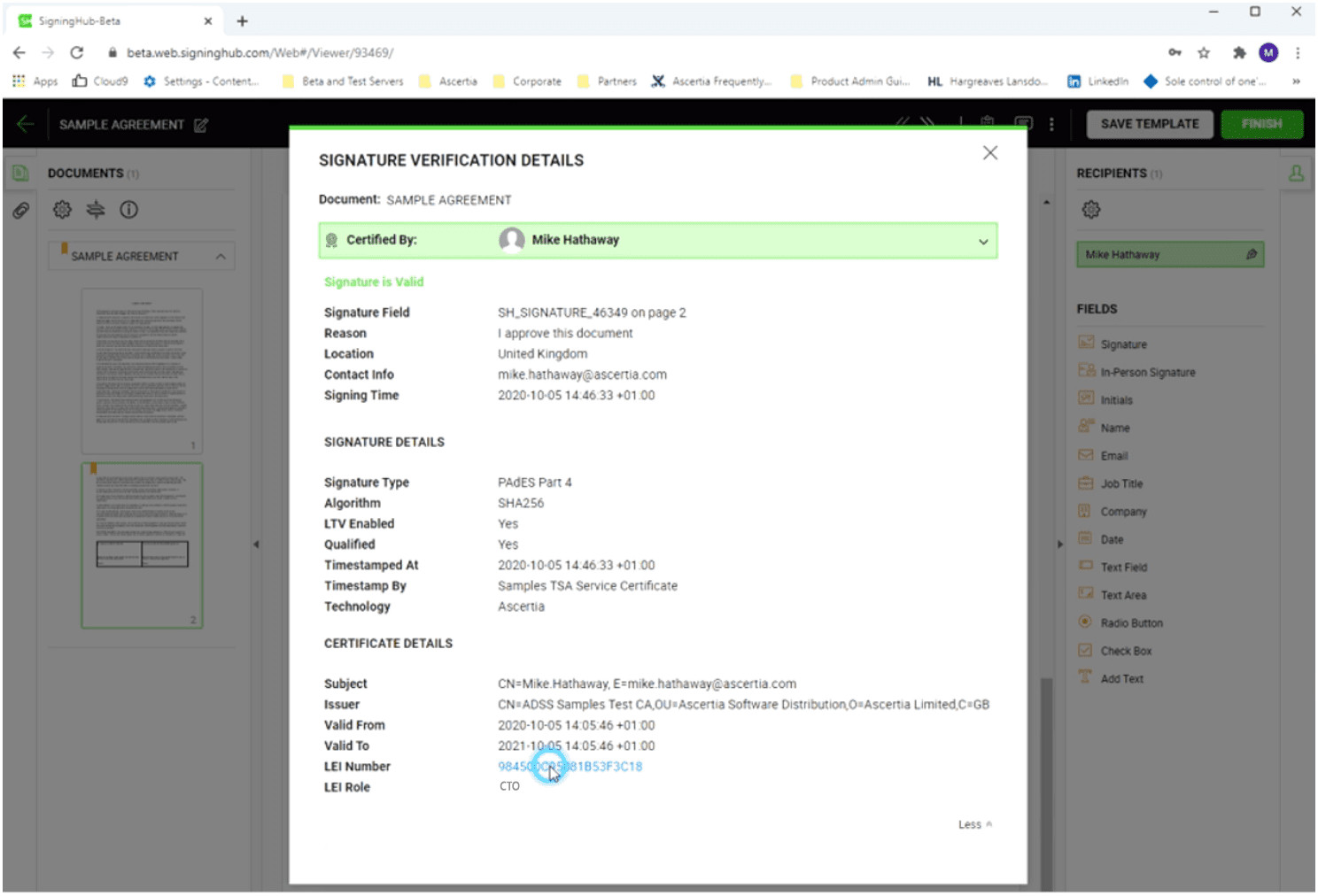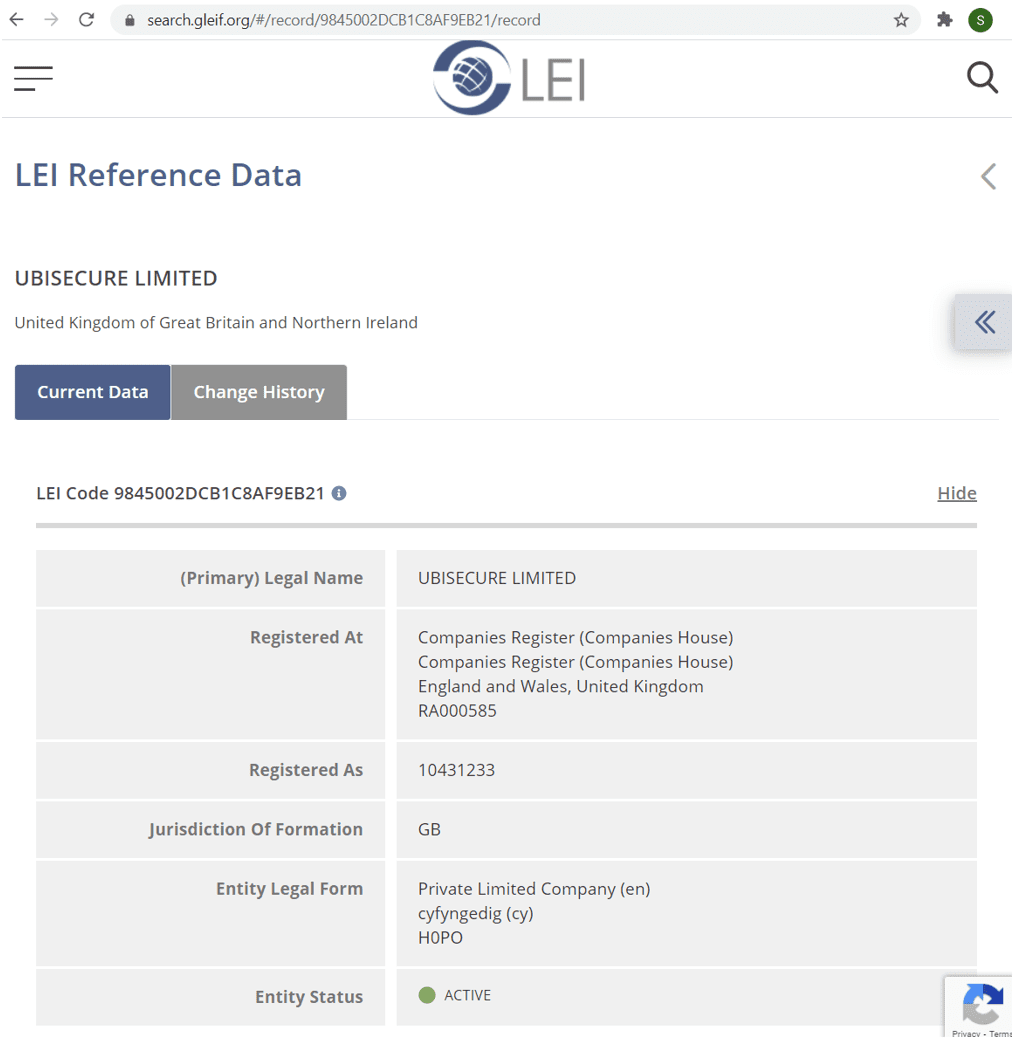Ascertia, the company behind SigningHub (the e-document signing and management service) announced that the October 2020 release now supports Legal Entity Identifier (LEI) inclusion and display for signatures created by LEI-enabled Qualified Digital Certificates.
“Where a certificate used for document signing has a Legal Entity Identifier (LEI) set as an extension, the LEI information now appears in the signature verification dialog in SigningHub. The LEI information in the verification dialog also provides a link to the LEI information at the Global Legal Entity Identifier Foundation (GLEIF).”
Victoria Allen, SigningHub v7.7.9 release announcement
 An example of an e-document signed by an LEI-enabled Qualified Digital Certificate. Clicking on the LEI Number allows the relying party to view the Legal Entity identity record at the Global LEI System public database.
An example of an e-document signed by an LEI-enabled Qualified Digital Certificate. Clicking on the LEI Number allows the relying party to view the Legal Entity identity record at the Global LEI System public database.
What are LEIs?
LEIs are unique 20 digit codes representing an organisation’s identity. LEIs are validated by a small number of accredited LEI Issuers (like Ubisecure via our RapidLEI service) and then centrally registered in the Global LEI System (GLEIS) database.

Why does embedding an LEI matter?
The LEI is standardised across all jurisdictions. It is endorsed by the G20 and the Financial Stability Board and regulated by the Global LEI Foundation (GLEIF). It is essentially the only truly standardised global organisation identifier.
It’s not uncommon for a legal entity to change its legal name or address, to go out of business, or to change ownership. Such changes need to be understood by parties relying on the identity information.
Fortunately, the LEI code is a live, permanent reference to an organisation’s identity record – a record that includes any historical changes to the identity data itself. LEI data is publicly available and a record of changes are maintained and freely accessible to all relying parties. The LEI ensures that any entity or service that has reliance on the record has the critical ability to see both currently validated identity data and review historical changes.
When embedded within a digital signature, thanks to the signature’s timestamp, the relying party has the ability to verify the signer’s organisation identity at the exact point the signature was created. Because the LEI record maintains a full history of changes, the relying party also has full traceability of the organisation from that point of signing onwards should there have been any changes to the LEI record.

The LEI record for UK-based “Ubisecure Limited” – including display of the current data and record change history such as change to legal names, addresses etc.
Digital Signature + Live Data + Historical Changes
The ability to combine live data with a historical reference offers traceability and visibility advantages over the static identity data usually embedded within digital certificates and digital signatures. When relying on such a system, being able to include a signature with live identity data and access to a history of changes is the equivalent to having your cake and eating it! The best of all worlds.
How to embed your LEI
To embed an organisation’s LEI into the signature, the enterprise must use an LEI-enabled Qualified Digital Certificate such as those issued by FirmaPro. Because both the LEI and the Certificate holder’s right to include the LEI is validated, the inclusion of the LEI in the document’s digital signatures further enhances the credibility and trustworthiness of the document and its author. It also ensures signed documents meet the new European Securities and Markets Authority (ESMA) regulation for documents regulated by the European Single Electronic Format (ESEF).
The inclusion of LEIs in digital signatures is excellent news for users of SigningHub, as well as anyone relying on the signatures a SigningHub user has embedded into their document.
For more details on the SigningHub solution and where to obtain LEI-enabled Qualified Digital Certificates visit RapidLEI’s LEI Marketplace.



About The Author: Steve Waite
As Chief Marketing Officer, Steve is responsible for Ubisecure’s corporate marketing and communication, partner and customer communication, demand generation and brand development.
More posts by Steve Waite